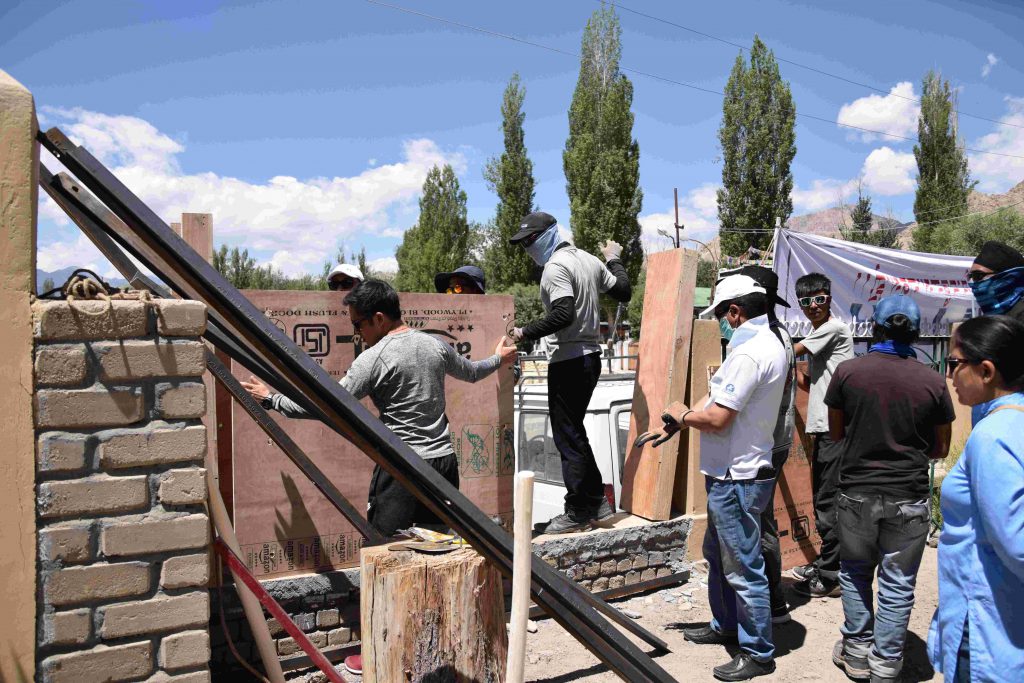WHO we are
Innovation that excites
We are Ladakh Ecological Development Group, our early focus was in the Rural Areas providing support to the locals in building environmental friendly structures using locally available materials, now that we are seeing rapid urbanization the organization has shifted the focus in Urban Areas.

Founder
Helena Norberg-Hodge
The Ladakh Project was started as a result of growing trends of ‘Western Modernity’ and the resultant dismissal of local culture and environmental degradation.
The efforts of the Ladakh Project led to the founding of LEDeG in 1983.
LEDeG has organized sustainable development programs in remote villages of Ladakh as well as the main towns of Leh and Kargil.
President's note
Sarla Chhewang
It gives me immense pleasure to see a lot of young and promising talent from different backgrounds working with LEDeG. The main aims and objectives of this project are to make Leh town environmental-friendly, resilient and sustainable urban city. It was felt that the capacity of the policymakers needs to be enhanced. Also, young and dynamic administrators and future leaders need to be groomed for making and implementing good decisions for the betterment of the town. Hence, we organized several town hall meetings, exposure visits for seniors and mid-level officers/officials, conducted trainings and workshops at various places in Leh and other parts of India, in 2018 and 2019. In particular, my sincere thanks to Mr Stanzin Tsephel, Director of BORDA South East Asia, for his unconditional support and guidance since the day I assumed charge as the executive director of LEDeG.
Director's desk
Eshey Tondup
It is also important to reflect on the past performances of the organization. Hence, I will start by giving a brief introduction and listing the achievements of the organization in the past. Ladakh Ecological and Environmental Group (LEDeG) is one of the most reputed and influential NGOs in both Leh and Kargil districts. LEDeG was conferred with many international and national awards. While continuing its services in remote and inaccessible areas of Ladakh, LEDeG reached an agreement with the European Union and BORDA in 2018 to collaborate to work on urban issues in Leh under a project called the LIVEABLE LEH.
Appropriate tech
Development of agricultural tools, R&D in various agriculture tools
Agriculture
Providing support to local self help groups in value addition to their produce.
rural building center
building-related techniques with the help of locally available materials and also R&D in various locally available building materials.
handicraft
Providing support to local women self help groups in new and improved handicraft techniques and also value addition.
Core values
We provide opportunities to succeed
We provide support to the locals in many different fields such as constructing environmental friendly houses, Traditional and Modern Handicraft Training, Local food processing techniques, and value addition to locally processed produce.
We also provide support to the governmental departments in optimizing their workflow, by conducting workshops in various fields and also support them in various Exposure tours across the country in various fields pertaining to their organization.
Keep leh clean
Kaga Thelmet Video Series
biggest threat
Biggest threat to Ladakh
Keep leh clean
Keep Leh Clean
sanitation worker
Life of a Sanitation Worker
follow us on social media
Ladakh ecological development group
Copyright © All Rights Reserved Ladakh Ecological Development Group 2023


